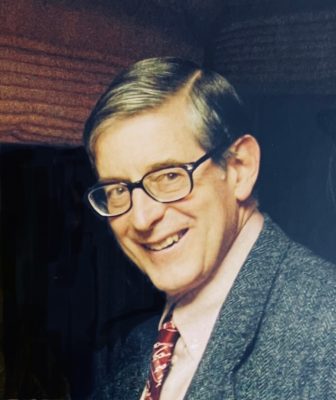Sadly, Prof. Emeritus Winthrop W. Smith passed away in Peabody, MA on April 7, 2025, with his devoted daughter Sarah by his side. After growing up in New Jersey, Win received his undergraduate and graduate degrees in physics from Amherst and MIT, respectively, and then undertook postdoctoral work at the Joint Institute of Laboratory Astrophysics (JILA) in Boulder, Colorado, where he met his late wife Anne. He began his academic journey at Columbia University, in New York City, eventually transitioning to the University of Connecticut, where he spent a long and illustrious career teaching and performing research in physics, officially retiring in 2009.
 Win’s research was primarily in the field of atomic, molecular, and optical (AMO) physics. The systems he studied covered a diverse range, including: electrons; ions (both positive and negative); atoms; molecules; and photons. They also spanned a wide spectrum of energies, from relativistic to ultracold. His experiments employed a variety of tools, such as lasers, spectrometers, particle beams, accelerators, and traps for atoms and ions. Win investigated many interesting topics, including: charge-exchange collisions; highly-charged ions; molecular spectroscopy; collision-induced x-ray emission; relativistic negative ion beams; atom interferometry; linear rf traps for ions; and nonlinear dynamics (chaos). He was very productive, with his work resulting in over 100 journal publications. His latest research, performed mainly after officially retiring, involved interactions between overlapping samples of trapped ions and ultracold neutral atoms, and garnered significant attention.
Win’s research was primarily in the field of atomic, molecular, and optical (AMO) physics. The systems he studied covered a diverse range, including: electrons; ions (both positive and negative); atoms; molecules; and photons. They also spanned a wide spectrum of energies, from relativistic to ultracold. His experiments employed a variety of tools, such as lasers, spectrometers, particle beams, accelerators, and traps for atoms and ions. Win investigated many interesting topics, including: charge-exchange collisions; highly-charged ions; molecular spectroscopy; collision-induced x-ray emission; relativistic negative ion beams; atom interferometry; linear rf traps for ions; and nonlinear dynamics (chaos). He was very productive, with his work resulting in over 100 journal publications. His latest research, performed mainly after officially retiring, involved interactions between overlapping samples of trapped ions and ultracold neutral atoms, and garnered significant attention.
Over the years, Win taught and trained a large number of undergraduates, graduate students, and postdoctoral researchers, and was a valued mentor to younger faculty. In terms of classroom teaching, Win’s portfolio encompassed multiple areas of physics: classical mechanics; electricity & magnetism; quantum mechanics; atomic physics; optics; lasers; electronics; and introductory physics for various audiences. He took great pleasure in motivating his students and seeing them learn.
Win was heavily involved in the American Physical Society (APS), serving as an officer in the New England Section (NES), the Division of Atomic, Molecular and Optical Physics (DAMOP), and the Division of Laser Science (DLS). He also played a key role in organizing several large physics conferences in Storrs: DAMOP Annual Meetings in 1984 and 2000; and the International Conference on Atomic Physics (ICAP) in 2008. Win spent a year as a Program Officer for the National Science Foundation, helping set funding priorities for AMO Physics. He also performed significant service for the Department and University, serving in the University Senate, as President of the UConn Chapter of the American Association of University Professors (AAUP), and as a member and chair of many committees.
Win enjoyed traveling and collaborating with colleagues and thereby embarked on several sabbaticals: JILA, Stanford, Munich, Aarhus, MIT, and the Harvard-Smithsonian Center for Astrophysics. He also worked with colleagues at various national labs: Los Alamos in New Mexico, Oak Ridge in Tennessee, Lawrence Livermore in California, and the Jet Propulsion Lab in Pasadena.
Win’s accomplishments earned him several honors. He received Fellowship in the American Physical Society, an Alexander von Humboldt Senior Scientist Research Award to work in Germany, and Membership in the Connecticut Academy of Science and Engineering.
Interestingly, his great-uncle, Percy Bridgman, a professor at Harvard, won the 1946 Nobel Prize in Physics for his work in high-pressure physics, leaving a strong impression on the young Win.
Win had many outside interests including: music, singing in the Hartford Chorale and the UConn Festival Chorus; and hiking and skiing in the White Mountains near Randolph, New Hampshire. He was passionately interested in politics, serving locally on the Mansfield Town Ethics Board and Democratic Town Committee.
Win will be greatly missed, and fondly remembered, by the Physics Department. In his memory, donations can be made to the Anne and Win Smith Fellowship Fund for support of graduate students in physics, or the American Civil Liberties Union (ACLU).